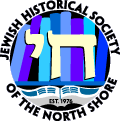

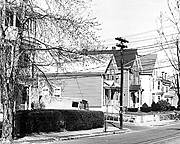
Neighborhoods
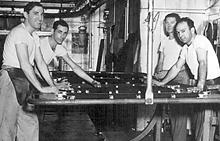
Workplaces
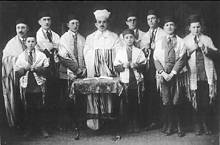
Worship
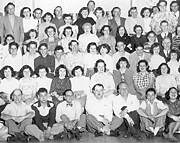
Community
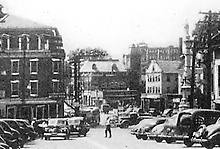
Downtown
If there is anything to distinguish the Jewish world in Peabody of 2002 from that of 1968, it is the interesting axiom that “the more things have changed the more they have stayed the same.” While the world of 2002 is vastly different from the world of 1968, with an emphasis on new technology, diversity of culture, the fall of Communism and the new terror of Militant Islam, how has Jewish Peabody changed? Well, for one, the population of Peabody has increased, but not drastically. While in the 1960’s there were predictions of an overall population of close to 100,000, Peabody has hovered around 50,000 for about 20 years. The Jewish population has steadily increased. The Route 128 technology companies, the new industrial parks in the area, and the general move of families from urban areas near Boston, have all added to the increase. It is estimated, based on information from the Jewish Federation of the North Shore, that the Jewish population may be close to 4,500 made up of almost 2000 families. Peabody has become a destination city for the Jewish middle and upper-middle class. However, it appears that the Jewish population may have peaked, and we will see if that is true in the future.
As America became more homogenous and assimilated, so did the Jews of Peabody. The population shift from the central Peabody area to West Peabody and South Peabody has continued. Because of this shift, and other factors, in the 1970’s Congregation Sons of Israel and Congregation Anshe Sfard, experienced declines in membership, as did the Peabody Hebrew School and the Hebrew Community Center. Because of this, in 1978, Anshe Sfard was forced to close. However, its heritage was transferred to Sons of Israel. The Ark and Yahrtzeit Tablets remain at Congregation Sons of Israel. In the late1970’s the Hebrew School, and then the Community Center were forced to close. However, the building was kept and preserved, and years later, through efforts led by David Remis, and his sons, Justin and Shepherd, the assets of the Community Center were distributed throughout the community and North Shore to educational institutions and synagogues. Congregation Sons of Israel was able to reverse the decline. From 1962 to 1998, M. Irving Herbster served as its Ritual Director. Bart Perlman, who had been conducting services, then became Ritual Director until 1999. Avrom J. Herbster is the current Ritual Committee Chair. Presidents since the 1960’s have been Irving Sacks, Sidney Barosin, Hyman Sogoloff, and the current President is Harvey Chandler. The Synagogue became egalitarian in 1993, allowing women full participation in services, and now calls itself a Traditional congregation. It has approximately 240 member families. Congregation Tifereth Israel was served for many years by Rabbi Dov Pikelny. Joseph Gibely II continues his long service as President since 1972. Joanne (Pernitchi) Pressman has maintained the legacy of the Sephardic liturgy as a cantorial leader.
Temple Ner Tamid continued to grow. Rabbi Abraham Morhaim served for 29 years until 1996, and was succeeded by Rabbi Leonard Muroff. Rabbi David Klatzker is the current Rabbi. Cantor Sam Pessaroff has served the Temple as Cantor and Teacher for over 25 years, and performs duties as a Mohel in the area, and beyond. The Temple maintains an active Hebrew School, Womens League, Mens Club, and a large and active USY (Untied Synagogue Youth) group. There are over 300 member families, and Todd Levine is current President. Temple Beth Shalom continued to grow as well, and as one of the few Reform Temples in the area, has attracted members from many surrounding cities. Rabbi Burton Padoll served the Temple for many years, and he was followed by Rabbi Arthur Nemitoff and Rabbi Philip Aronson. Rabbi Howard Kosovske is the current spiritual leader, and Robin Sparr-Rothman is Cantorial Soloist. Marcie Cohen is President. Temple Beth Shalom has several active organizations including a Religious School, Pre-school Sisterhood, Mens Club and Chai Club. Chabad Lubavitch of the North Shore, affiliated with the Lubavitch Chassidic movement, established a Hebrew School in recent years that is currently operating in the Kiley School. It is led by Rabbi Yossi and Rebbetzin Layah Lipsker.
Although the Hebrew Community Center closed in the 1970’s, it wasn’t long after, in 1979, that a new Center was established in West Peabody, where the Jewish population was now based. In was established as the North Shore Jewish Community Center, and was first located in the then Kings Plaza on Lowell St. In 1994 the Center relocated to its Pine St. location, and became known as the North Suburban Jewish Community Center. The Center serves Peabody and surrounding communities. It maintains a number of varied programs from child daycare, preschool, sports activities to arts, social activities and Jewish cultural programs. The NSJCC continues to grow in members and activities, and has about 200 family members. Seth Landau is the current President. Many of the civic organizations that were active in the 1960’s continue to flourish. However, with the proliferation of other credit unions and more banks, the Popular Credit Union closed. Other youth groups that met at the Peabody Hebrew Community Center such as the boy’s youth group, Louis D. Brandeis Chapter of AZA, the girl’s group, Young Judea, and Troop 97 (formerly Troop 7), a primarily Jewish Boy Scout Troup, faded and closed in the 1960’s. Many other organizations continue to flourish. Hadassah, originally Peabody based, now includes members from the surrounding cities and towns, and has over 400 members. Ruth Sigel is President. B’nai B’rith Peabody lodge recently merged with the Beverly lodge, but the members still annually run a popular food concession booth at the Topsfield Fair to raise needed funds for national programs. ORT still maintains its presence in the area, and is part of the Eastern Massachusetts Chapter. Linda Magalnick is its representative. The Peabody United Jewish Appeal became part of the Jewish Federation of the New Shore, now located in Salem. The Jewish War Veterans Post 220 and Auxiliary continue, and its members are active in veterans affairs, the Peabody Veterans Council, and participate in the Peabody Memorial Day parade and other activities. Its Commander is Moe Sack, and Ladies’ Auxiliary Commander is Dorothy Katz. Gloria Teller recently served as National President of the Ladies’ Auxiliary. Maple Hill Cemetery continues to serve the needs of older, and now, newer Jewish families in Peabody. Recently, it established a separate, Interfaith section of the Cemetery. Eliot Edelstein is the current President.
The Holocaust Center Boston North was established in 1982 for the study and remembrance of the Holocaust. It was located for many years at the McCarthy School, and in 2001 relocated to the Peabody Institute Library. The Center now also encompasses education about other genocides and human rights. Harriett Wacks, a Founder, is Director, and Sonia Weitz, also a Founder, continues as a guiding force. Weitz was recently given the honor of being selected to serve on the governing Council of the United States Holocaust Memorial Museum. Her husband, Mark Weitz was a prominent doctor in the City.
In 1997, the Jewish Rehabilitation Center of the North Shore opened Woodbridge, an assisted-living facility, in a wooded area of Lynnfield St. Woodbridge has 82 apartments, and many of its residents are of the Jewish faith. Kosher meals are served and Jewish activities are conducted at Woodbridge.
Since the center of Jewish life shifted to the West, and because of assimilation, Jewish merchants became few in the central part of the City. In fact, the downtown area, like many urban areas, changed, so that the corner drug stores, such as Ordman’s, operated by Harry Ordman, and retail stores such as Remis Furniture, operated by David Remis, were closed. The retail center became the North Shore Shopping Center, now the North Shore Mall, and it was populated more by regional and national merchants. In fact, it appears that Larry Levine’s Kosher Meats, now established in Peabody, may be the only retail establishment selling an exclusively Jewish product in the City. It is also hard to believe that in 2002 the leather industry that supported so many Jewish families, with its leather workers and tannery owners, had long ago come to a virtual end, with just a few small factories left. Through all these changes, Ray Wallman, a photographer for over 50 years, has continued to chronicle both the Jewish community and Peabody as a whole.
Jews continued to make a contribution to the civic life of Peabody. Among the city officials who have held elected office since 1968 are: Councilors David Harris, Shepard Remis, Barry Feinstein and Judith Selesnick; Library Trustees Albert Cohen, Mark Titelbaum, Judith Wolfe and Robert Shaw. Bernard Horowitz is the appointed Director of Human Services, and is responsible for operation of the Health Department. There are also Jewish citizens who have been appointed to city boards and committees as well as positions in the schools, police and fire departments.
There have been a number of Jewish people from Peabody active in the Arts, even from the early years. Katherine Locke was active in stage and film in the 1930’s to the early 1950’s. Doris (Halpern) Schwerin is the author of the biographical book “Diary of a Pigeon Watcher” (1976), which offers interesting vignettes and details of her life growing up Jewish in Peabody as the daughter of the first Jewish Doctor, who was a friend of Mayor Bakeman. Sidney Goldfarb has been a poet and playwright, and in the 1960’s wrote a poem about his native city. More recently, Jonathan Sacks, is an orchestrator for many popular films, and Gary Gulman is a rising stand-up comic, having made a number of television appearances.
Peabody has had a share of outstanding Jewish athletes, mainly at the local high school level high, including in Football: Solly and Ken Beres in the 1930’s; Ralph Bender and Saul Katzman in the 1940’s (also Basketball); Sidney Goldfarb in the 1950’s; Jay Shapiro in the 1960’s, who went on to a successful college career; Marc Kerble in the 1970’s; and Stuart and Steven Molk, who played in the 1970’s.
Peabody’s Jewish Community continues to play an integral part in the vitality of the City. Jewish organizations and individuals participate in city affairs from events such as periodic parades, the annual International Festival and organizations such as the Clergy and Ministerial Association and the “No Place for Hate” Committee. The Washington St. home of Dr. Benjamin Salata, a prominent dentist for many years, recently was given by his wife, Celia, to the Peabody Historical Society, and it has been restored as the Osborn-Salata House.
Peabody, Massachusetts is a unique place. It began as a small town; it became the leather city of the world, and is now a center of new industry, business, and is a suburban destination community. It has always sustained a remarkable mix of ethnic “diversity,” before that word was even popular. In 2002, it is evident that the Jewish citizens of Peabody have done much to add to the vibrancy of this City, and have done much to help weave the tapestry that is — Peabody, Massachusetts.